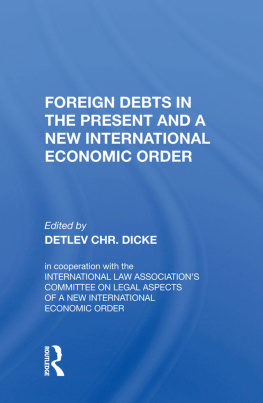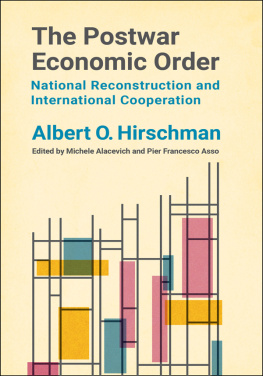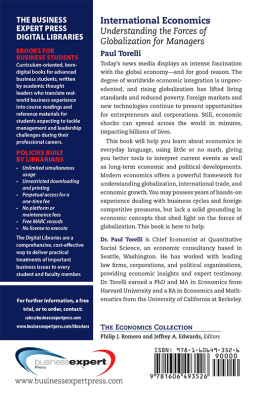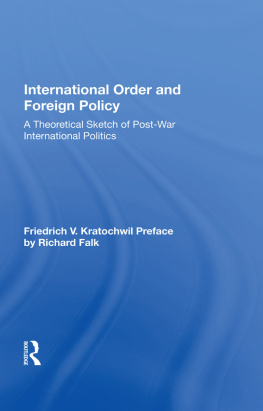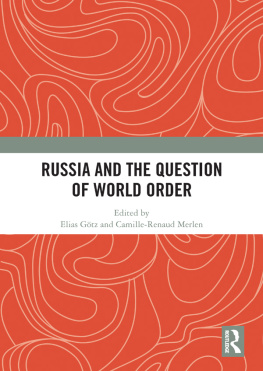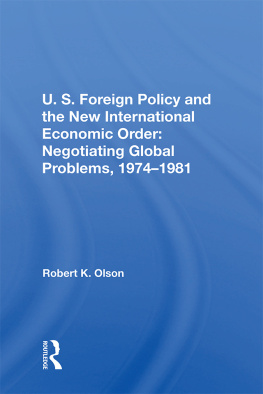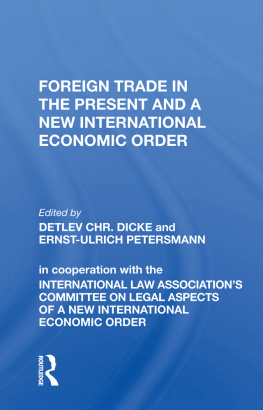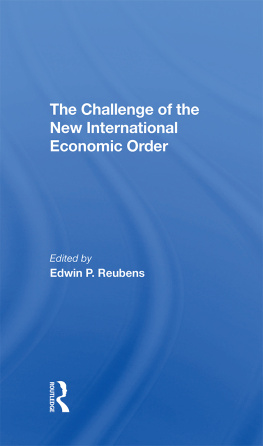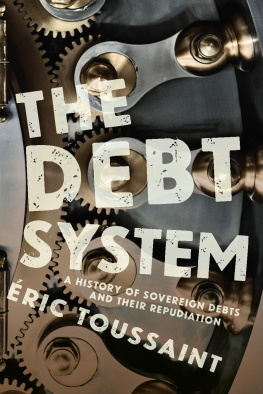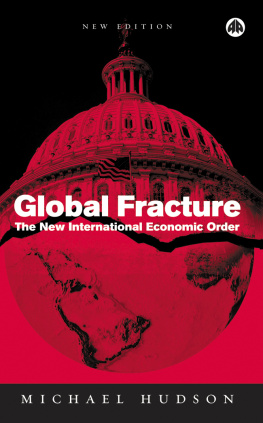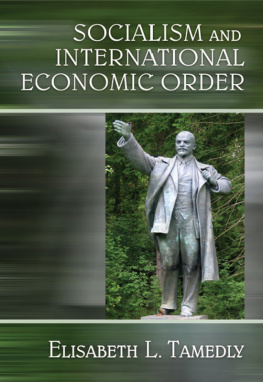FOREIGN DEBTS IN THE PRESENT AND A NEW INTERNATIONAL ECONOMIC ORDER
Progress and Undercurrents in Public International Law PUPIL Edited by Detlev Chr. Dicke
Volume 1
PUPIL Progress and Undercurrents in Public International Law
Foreign Debts in the Present and a New International Economic Order
Edited by
Detlev CHR. Dicke
University of Fribourg Switzerland
in cooperation with the
International Law Association's
Committee on Legal Aspects
of a New International
Economic Order
First published 1986 by Westview Press, Inc.
Published 2018 by Routledge
52 Vanderbilt Avenue, New York, NY 10017
2 Park Square, Milton Park, Abingdon, Oxon OX14 4RN
Routledge is an imprint of the Taylor & Francis Group, an informa business
Copyright 1986 Taylor & Francis
All rights reserved. No part of this book may be reprinted or reproduced or utilised in any form or by any electronic, mechanical, or other means, now known or hereafter invented, including photocopying and recording, or in any information storage or retrieval system, without permission in writing from the publishers.
Notice:
Product or corporate names may be trademarks or registered trademarks, and are used only for identification and explanation without intent to infringe.
Library of Congress Cataloging-in-Publication Data
Foreign debts in the present and a new international economic order.
Includes index.
1. Loans, Foreign. 2. Debts, External. 3. International economic relations. I. Dicke, Detlev Christian.
HG3891.5.F67 1987 336.3'435 87-2185
ISBN 13: 978-0-367-00684-6 (hbk)
To MAX GUTZWILLER
Vice-President
of the
International Law Association
Professor Emeritus
University of Fribourg Switzerland
Contents
Kamal Hossain
Antonio Belaunde-Moreyra
Gaston Gaudard
Milan Bulajic
Rer J .H. Smits
Hugo J. Hahn
Karl M. Meessen
Petar Sarcevic
Carlos E. Sanson
Rudolf Bosshard
Ernst-U. Petersmann
Rudolf von Graffenried
Thomas E. Krayenbhl
Detlev Ch. Dicke
David Flint
Subrata Roy Chowdhury
Reginald Herbold Green
Paul Kirchhof
Signing the "imprimatur" for a book is always a moment of great gratification. But if it is the first volume of a series one intends to edit, the feeling is more differentiated. There is the onus for the future, the promise given to oneself and to those who are - one hopes - going to subscribe. On the other hand, as starting cm a venture like this needs an incurable optimism, it is only the final proof of it.
In the present case the optimism is not too badly founded, as I was already able to enlist the co-operation of my friends and colleagues from the International Law Association's (ILA) Committee on Legal Aspects of a New International Economic Order. The envisaged first five volumes could even lead to the misunderstanding that the series might be some sort of inofficial organ of publication of the Committe. But actually this impressive co-operation is the back-bone of my enterprise. Thus my acknowledgements must begin with my heart-felt thanks to the members of this Committee.
As the title of the series "Progress and Undercurrents in Public International Law" with the abbreviation PUPIL - admittedly a public relations gag but with an after-thought - indicates it will not contain the most scholarly written volume on Hugo Grotius or the diplomatic relations between the city-states of ancient Greece. Nor is there any ambition for utopia. What is intended, is the step-by-step approach towards a more just and equitable International Order, an equilibrium of interests based cm understanding and experience in a rapidly changing world. What the title of the series does not indicate, is the fact that it will comprise only research on International Economic Law in the broad sense of the word - that means including other areas like environmental law or the law of the sea as far as they are interrelated with economic questions. The language of publication will be exclusively English with some French intermittencies - summarized in English - due to the genius loci of Fribourg and the working languages of the ILA.
I have the great honour, and take it as an excellent omen, to dedicate this book to Prof. Max Gutzwiller, the Vice-President of the ILA, who at ninety-seven years of age is the grand old man of our Law Faculty and even of Swiss jurisprudence. As one of the founders of MOCOMILA, the Monetary Committe of ILA, he initiated discussions in the ILA on the problems this volume deals with.
The symposium, the proceedings of which are here published, was made possible by quite a number of sponsors. Of course, my thanks go to them all. But I must especially mention the co-operating banks for their two-fold help. They contributed not only financially, but also with their know-how through some excellent reports on specific topics, where practical experience was needed. The success of a symposium depends very much on its chairmen. That is why I am extremely grateful to Prof. Leo Schrmann, former Vice-President of the Board of Directors of the Swiss National Bank, and Prof. Alfred E. von Overbeck, Director of the Swiss Institute for Comparative Law and former President of the Swiss Branch of ILA, both members of our law faculty at Fribourg/Switzerland, as well as Dr. Kamal Hossain, Chairman of our ILA Committee.
Last but not least I have to thank all those who helped organizing the symposium, getting the reports and the discussions into proper form and editing this volume. With my lightly given promise to have the book ready for the Seoul Conference of the ILA, which meant to have it ready for the printers within four months after the symposium, we relied on the help of far too many persons than can be named here. But I know about the difficulties, their efforts and their efficiency. Nevertheless I cannot omit to thank two of them personally - that is my assistant Mr. Erwin Dahinden, the pivot of all the organizing and editing, and my secretary Ms. Patricia Ragonesi for her indefatigable zest with the manuscripts.
Fribourg, June 1986
Detlev Dicke
1. On behalf of the Federal Council I have the great pleasure of greeting you at your International Symposium. May this session of the "International Law Association's Committee on Legal Aspects of a New International Economic Order" have the success it deserves. Also many thanks to Prof. Detlev Dicke for the organization of the symposium.
2. Your Committee is part of the International Law Association. This is an organization with which my country has been closely associated from its beginning and whose members are always particularly welcome in Switzerland. The Association was founded in 1873, together with the Institute of International Law. As a citizen of the Canton of Zurich, I am particularly proud that, together with men such as Mancini, Asser, Dudley Field and Rolin-Jaequemyns, my compatriot and author of the Civil Code of Zurich, Bluntschli, was amongst their founding fathers.
Some people considered the Institute and the Association - which was originally called the "Association for the Reform and Codification of the Law of Nations" - as twins; others said the former should be the "Senate" and the latter the "Assembly."

